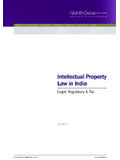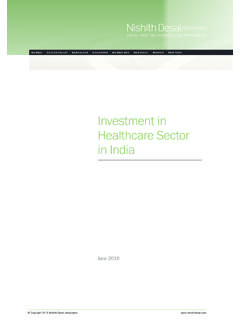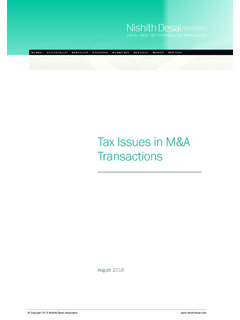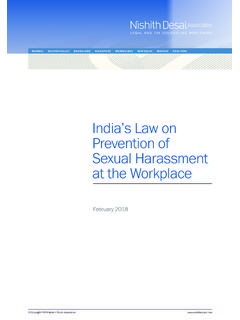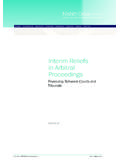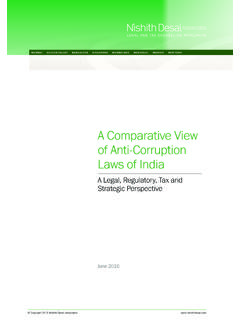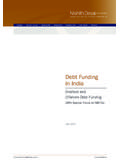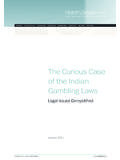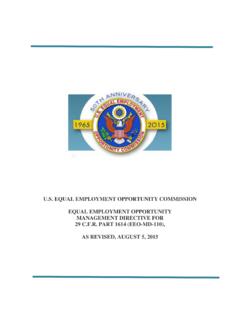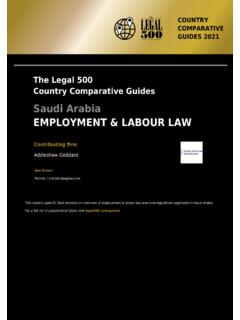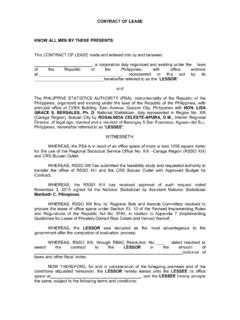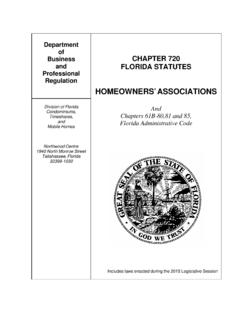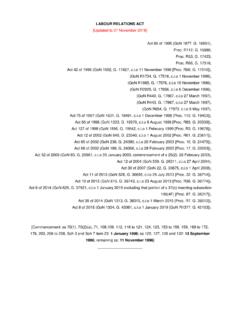Transcription of Private Equity and Private Debt Investments in India
1 Copyright 2018 Nishith Desai Associates March 2018 Private Equity and Private Debt Investments in IndiaMUMBAI SILICON VALLEY BANGALOR E SINGAPORE MUMBAI BKC NEW DELHI MUNICH N E W YORKP rivate Equity and Private Debt Investments in India Nishith Desai Associates 2018 Private Equity and Private Debt Investments in India March Nishith Desai Associates 2018 Private Equity and Private Debt Investments in India ContentsABBREVIATIONS 011. INTRODUCTION 03I. Further liberalization of the foreign investment 03II. Introduction of GAAR 04 III. Removal of long term capital gains exemption 04IV. Tax neutrality on conversion of preference shares to Equity shares 05V.
2 Introduction of Thin Capitalization Norms 05VI. Relaxations notified by the Competition Commission of India ( CCI ) 05 VII. Revised guidelines for the determination of the Place of Effective Management ( POEM ) 06 VIII. Introduction of Bankruptcy Code 06IX. Amendments to the Tax Treaties with Mauritius, Singapore and Cyprus 062. Private Equity Investments 07I. FDI regime 07II. FVCI regime 15 III. FPI regime 17IV. NRI Investment 213. Private DEBT Investments 23I. The FDI Route 25II. FVCI regime 25 III. FPI regime 25IV. CCD vs. NCD 274. TAX CONSIDERATIONS AND EVOLVING STRUCTURES 28I. Overview of Indian Taxation System 28II. Specific Tax Considerations for PE Investments 335.
3 EXITS FOR Private Equity AND Private DEBT Investments 41I. IPO 41II. Trade sale 41 III. Buy-back 41IV. Depository Receipts( DRs ) 42V. Externalisation 43 Nishith Desai Associates 2018 Private Equity and Private Debt Investments in India 6. dispute resolution 44I. Impact of introduction of NCLT 45II. Class action 46 ANNEXURE I 47 ANNEXURE II 51 ANNEXURE III 53 Nishith Desai Associates 2018 Private Equity and Private Debt Investments in India 1 AbbreviationsAbbreviationMeaning / Full FormAARA uthority for Advanced RulingsADRA merican Depository ReceiptAIFA lternative Investment FundsAIF RegulationsSEBI (Alternative Investment Funds) regulations , 2012 BITsBilateral Investment TreatiesCA 1956 Companies Act 1956CA 2013 Companies Act 2013 CBDTC entral Board of Direct TaxesCCDsCompulsorily Convertible DebenturesCCPSC ompulsorily Convertible Preference SharesCLBC ompany Law Board Contract ActIndian Contract Act, 1872 DDPD esignated Depository ParticipantDDTD ividend Distribution TaxDIPPD epartment of Industrial Policy and PromotionDTAA / Tax treatiesDouble Taxation Avoidance AgreementsEBITDAE arnings Before Interest Tax Depreciation AmmortizationECBE xternal Commercial BorrowingFDIF oreign Direct InvestmentFDI PolicyForeign Direct Investment Policy dated May 12.
4 2015 FEMAF oreign Exchange Management ActFIPBF oreign Investment Promotion BoardFIIF oreign Institutional InvestorFPIF oreign Portfolio InvestorFPI RegulationsSEBI (Foreign Portfolio Investment) Regulation 2014 FundsInvestment fund FVCIF oreign Venture Capital InvestorFVCI RegulationsSEBI (Foreign Venture Capital Investors) regulations , 2000 FYFinancial YearGAARG eneral Anti-Avoidance RulesGDRG lobal Depository ReceiptICAI nternational Commercial ArbitrationICDR RegulationsSEBI (Issue of Capital and Disclosure Requirements) regulations , 2009 IOSCOI nternational Organization of Securities CommissionIPOI nitial Public OfferingITAI ncome Tax Act, 1961 Provided upon request only Nishith Desai Associates 2018 2 LTCGLong Term Capital Gains LoBLimitation on BenefitsLPLimited PartnerMATM inimum Alternate Tax NBFCNon-Banking Financial CompaniesNCDNon-Convertible DebentureNRINon-Resident IndianOECDO rganization for Economic Co-operation and DevelopmentOCDO ptionally Convertible DebentureOCIO verseas Citizen of IndiaOCRPSO ptionally Convertible Redeemable Preference ShareODIO ffshore Derivative InstrumentsOHCO ffshore Holding CompanyPANP ermanent Account Number Press Note 8 Press note 8 of 2015 notified by the DIPP on July 30.
5 2015 Press Note 12 Press note 12 of 2015 notified by the DIPP on November 24, 2015P-NotesParticipatory NotesPDPrivate DebtPEPrivate EquityPIOP erson of Indian OriginPIPEP rivate Investment into Public EquityPISP ortfolio Investment SchemeQFIQ ualified Foreign InvestorR&W InsuranceRepresentation and Warranties InsuranceRBIR eserve Bank of IndiaREITsReal Estate Investment TrustRoEReturn on and Exchange Board of IndiaSGDS ingapore DollarSTCGS hort Term Capital Gains STTS ecurities Transaction Tax TISPRO RegulationsForeign Exchange Management (Transfer or Issue of Security by a Person Resident Outside India ) regulations , 2000 TRCTax Residency Certificate UNUnited NationsUSDU nited States Dollar Nishith Desai Associates 2018 Private Equity and Private Debt Investments in India 31.
6 Introduction After recording it s highest ever PE Investments in the year 2015 , staggering to an amount of over $ billion,1 India Inc. witnessed a slight dip in PE activity in 2016 with PE infusion of $ billion spread across 620 deals. However, the year 2017 surpassed the marvels of 2015 , both in terms of average deal size and overall deal value. The year 2017 recorded PE Investments worth $ billion spread across 639 are some of transaction trends / issues that have gained significance in 2017:I. Further liberalization of the foreign investmentSince 2015 , a large number of sectors, which were hitherto regulated, such as such defense sector, construction-development sector, broadcasting industry, e-commerce, retail, Private security agencies etc.
7 Have now been liberalized. The Government has been keen on handing over the responsibility of granting approvals to relevant sectoral regulators, instead of the FIPB, for instance insurance, defense and financial services sector. The Government has 1. Available at: its decision to abolish the FIPB by way of the introduction of Standard Operating Procedure ( SOP ) for processing the FDI proposals, issued by the DIPP on June 29, 2017. The focus of the SOP is to process such applications in a time bound manner so that the new regime for foreign Investments may be simpler in execution and expeditious in disposal. The SOP has come into effect from the date of its , in November, 2017, the RBI issued the Foreign Exchange Management (Transfer or Issue of Security by a Person Resident Outside India ) regulations , 2017 ( TISPRO regulations ) that superseded the seventeen years old Foreign Exchange Management (Transfer or Issue of Security by a Person Resident Outside India ) regulations , 2000 ( Old TISPRO ).
8 Besides streamlining the foreign direct investment regime in India , the TISPRO regulations has introduced several changes including overhauling of the foreign portfolio investment regime, liberalized investment regime for NRI / OCI and allowing foreign direct investment in an Indian listed company. The table below sets out some of the key changes introduced by the TISPRO regulations and its impact on foreign Investments in Changes and analysisFDI vs. FPI While the meaning of FDI remains the same as earlier in case of Investments into an unlisted Indian company, however any Investments of 10% or more of the post issue paid-up Equity capital on a fully diluted basis of a listed Indian Any investment below 10% made by an entity registered with SEBI as a FPI or otherwise shall be regarded as foreign portfolio investment.
9 TISPRO regulations clarifies that the total holding of an FPI may increase to 10% or more of the total paid up Equity capital on a fully diluted basis or 10% or more of the paid up value of each series of capital instruments of a listed Indian company, however such investment shall then be re-classified as FDI subject to the guidelines to be specified by SEBI and the RBI in this regard. Till such time the RBI and SEBI issues the operational guidelines in this regard, the old regime under the Old TISPRO would continue to be upon request only Nishith Desai Associates 2018 4 Capital InstrumentsThe term Capital under the Old regulations has been aligned with recent changes made to the FDI Policy and replaced with the term Capital Instruments that means Equity shares, fully, compulsorily and mandatorily convertible debentures and preference shares and share warrants.
10 It is clarified that the partly paid shares or share warrant can be issued subject to 25% upfront payment of the consideration and the balance to be paid within 12 or 18 months from the date of such issue respectively. It is further clarified that the Capital Instruments may also be issued with an optionality clause subject to a minimum lock-in of 1 year (or as may be prescribed for the specific sector, whichever is higher), however it has to be without any option or right to exit at an assured of shares by way of rights or bonus issueUnder the Old TISPRO, the Capital Instruments (other than the Share Warrants) purchased by the person resident outside India as rights issue or bonus issue shall be subject to the same conditions including restrictions in regard to repatriability as are applicable to the original shares against which right shares or debentures are issued.
